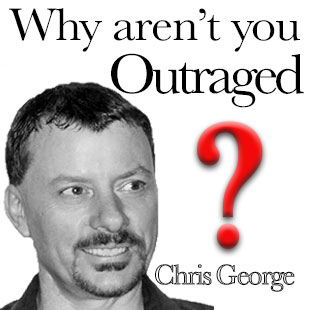
(CHRIS GEORGE / iNFOnews.ca)
September 05, 2017 - 12:11 PM
OPINION
"There are three kinds of lies: lies, damned lies, and statistics." - Benjamin Disraeli
Statistics are important. They can make sense of mountains of raw data, help illuminate connections between disparate ideas, and even help us see where we have been and where we might be going politically, economically and socially. It is this power of statistics that lies behind the collection of census data and Statistics Canada's assistance in helping all of us make sense of it. The previous federal government's willingness to throw the entire project under the bus was disheartening. I am glad the current government was willing to balance the needs of the bureaucracy for solid information against the people's ability to hold the government to account and found the argument for the former more compelling. Having good information to work with is important.
And we do need to work with it.
The early eighties saw us usher in the neo-liberal revolution. Reagan, Thatcher and in typical Canadian fashion, Mulroney a few years later, all showed us the path to the land of milk and honey. We were to find nirvana in austerity, and a more productive economy for everyone in the gutting of social programs (providing more incentive for people to work, and work hard) and the lowering of the tax "burden" on the highest incomes in all of our lands. Trickle down economics was born, and the promises of better jobs, higher pay and lowered poverty were just on the other side of the "necessary" reforms in how we were collectively managing our political economy.
It was all bunk, of course. Even the IMF has acknowledged the failure of "trickle down economics" to achieve any of its stated goals. In fact it is the rising inequality that is the natural outcome of the entire program that is depressing growth in the developed economies. And thanks to statistics, we can see how that inequality and its effects have played out here, in our very own province.
Starting in 1981, British Columbia has been primarily governed by the free enterprise coalition, first as the Social Credit Party and once that brand became tarnished, the BC Liberal Party. There was a ten year period in the 1990s where the "socialist hordes" were running the place, but in reality the primary economic policies remained firmly in the neo-liberal camp. So for thirty seven years we have been following the path of small government, balanced budgets and lower red tape. We haven't actually, of course, but that is the story and we'll stick to it for now as we examine the outcomes.
Things are good in British Columbia. We have the second highest median family income in the country, second only to Alberta. GDP has increased by 105%, and population by only 68.1%. GDP per capita is up by 22.2%. These are great numbers. We have doubled the economic output of our province and only added two thirds more to our population. This translates into a significant improvement in our overall productivity, at least at the broadest level. It turns out, though, that we have actually increased our population of people with earned income by 83% and our GDP per capita of income earners has risen by a scant 2.7% in thirty seven years. More people, as a percentage of the population, are working today than were working in 1981 and those workers are marginally more productive than those workers of yore.
We have also managed to increase child poverty from 11% in 1980 to 19.8% in the same time period.
Why is that?
Back to the IMF. They lay it at the feet of inequality. Not inequality in wealth, but inequality in incomes. So I went back to the Stats-Can site and did a bit of digging into the numbers around income. Average income is what ideologues typically use to make their points about how unfair the tax burden is on the "average" Canadian. A much fairer measure is median family income. Stats-Can measures how the family right in the middle of the pack is fairing. Equal numbers of families lie above the median as lie below it. And it turns out that the median family income in British Columbia, in 2015 dollars, has fallen by 7.4% since 1981.
Think about that for a moment.
This is how we can fumble something as basic as feeding our children so badly. We believed a pack of lies. More people are worse off today than they were almost forty years ago. The gutting of public resource royalties, the collapse of small town British Columbia, and the rise of part time, precarious employment have all contributed, but mainly it was the switch from an economy that served the people of the province to one that has been increasingly served by them for the benefit of others that has seen our overall standard of living slip. Some people are doing very well, of course, but in general, we are all a little poorer.
It is past time that we did something about it. Statistics, it seems, can illuminate the path forward a lot better than fairy tales. Perhaps it is time to get back to work making this a better place for all of us, instead of continuing to listen to hollow rhetoric and promises that we can clearly see mean nothing.
— Chris George believes one measure of a just society is found in how well it balances fiscally conservative economics with social responsibility and environmental soundness in all of its living arrangements.
News from © iNFOnews, 2017